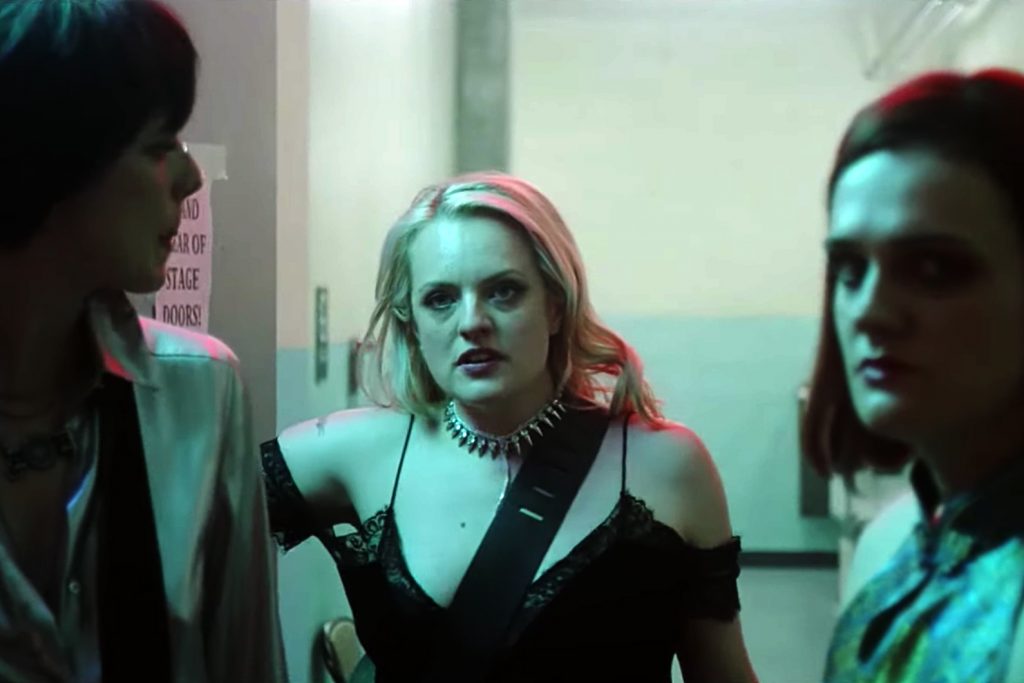Her Smell – Sydney Film Festival – Film Review
Reviewed by Damien Straker on the 9th of June 2019
Umbrella Entertainment presents a film by Alex Ross Perry
Produced by Elisabeth Moss, Matthew Perniciaro, Alex Ross Perry, Adam Piotrowicz and Michael Sherman
Written by Alex Ross Perry
Starring Elisabeth Moss, Gayle Rankin, Eric Stoltz, Dan Stevens, Cara Delevingne, Agyness Deyn, Ashley Benson, Dylan Gelula, Virginia Madsen, Amber Heard, and Daisy Pugh-Weiss
Music by Keegan DeWitt and Alicia Bognanno
Cinematography Sean Price Williams
Edited by Robert Greene
Rating: MA15+
Running Time: 135 minutes
Release Date: releasing as part of the 2019 Sydney Film Festival
Elisabeth Moss has successfully featured in television shows such as The West Wing, Madmen and The Handmaiden’s Tale, and has had small parts in Jordan Peele’s horror film Us (2019) and the Swedish drama The Square (2017). These minor film roles are dwarfed by her tour de force work in Her Smell where she plays a wayward rock star. At one point her nightmarish character tells her all-girl band, ‘enough jibber jabber! Let’s rock!’ The line is humorously delivered with the actress’s incredible gusto.
It is also advice that Her Smell’s writer and director, Alex Ross Perry, should have heeded. Perry, who has worked with Moss before, has allowed the actress to completely dominate proceedings. The brave decision to give Moss free rein to thoroughly explore and embody her character traits is fascinating. However, Perry’s generosity comes at the expense of enriching the side characters and story. It is an incredibly daring performance in search of a much stronger film.
As an example of Moss’s input, Perry’s screenplay draws from the actress’s upbringing. Her mother was a harmonica player in a blues band and her father was a jazz musician and manager. Moss says that her earliest memories include visiting various New York music clubs and being surrounded by musicians. She also attributes her parents for introducing her to the Church of Scientology. Some have suggested that her defence of the church led to split from her husband after only eight months. Her Smell uses Moss’s experience to forge an extremely problematic character who mirrors the challenges of her own life.
The film is not traditionally linear but comparable to the stage changes of a play. There are five acts with grainy home movie footage intercut between each one. The story is about an insufferable rock musician named Becky Something (Moss) who is antagonistic to everyone around her. After performing well on stage in her band, Something She, she returns to the backrooms and abuses her crew and her ex-husband, Danny (Dan Stevens). He has brought their young daughter, Tama, and his partner, Tiffany (Mind Hunter’s Hannah Gross), to see her. Becky also undertakes weird shaman rituals and pretends to curse the people around her.
In the second chapter, the band’s manager, Howard (Eric Stoltz), is worried Becky is wasting time in the recording studio and causing him to lose money. The other members of the band, including Ali (GLOW’s Gayle Rankin), leave. Consequently, Becky pairs with a new all-girl group (featuring Cara Delevingne). The girls are warned that Becky will ruin their careers. In the third chapter, their fears are realised when she arrives two hours late for a gig. Her crazed, irrational behaviour has disastrous consequences for everyone involved.
Perry’s restless, low-lit shooting style emphasises grittiness and character behaviour instead of a broader cinematic canvas. Four of the film’s five chapters are set backstage inside darkly lit rooms where people drink, argue with Becky, and take drugs. While lacking the same technical prowess, such as the extended single takes, the film’s bleak atmosphere is comparable to Alejandro G. Iñárritu’s Birdman or (The Unexpected Virtue of Ignorance) (2014). Like Birdman, Perry uses handheld cameras to follow the actors through similarly claustrophobic spaces, including backrooms and long, creepy passageways.

The fluency of the camera, as it swings and weaves violently to capture Becky’s crazed rants, is purposeful. It mimics her manic energy and illustrates the unpredictability of her speech, her physical movements and erratic behaviour. The narrow passages leading to the stage and the use of a red colour filter paint stardom as a form of mental imprisonment, which was also a thematic goal cleverly explored in Birdman.
Similarly, the inclusion of a shaman character and on-the-nose references to witches underline the nightmare imagery. The film’s over-the-top mood is deliberately exaggerated and occasionally humorous. As Becky’s behaviour deteriorates, the filmic style imitates the gothic horror of Darren Aronofsky’s Black Swan (2010) more than Birdman’s ‘comedy of errors’. Perhaps the nightmarish feel and claustrophobic spaces, coupled with the film’s tongue-in-cheek humour, is an impressionistic view or a parody of how people imagine Moss’s participation in show business and the cult of Scientology.
It is difficult to describe how brave and insane Elisabeth Moss’s performance is as Becky. She plays her partly as a bully, a woman possessed, and a witch rolled into one. It is a terrifying and deliberately insufferable character who Moss embodies with a violent amount of energy and intimidation. There are times when her dialogue resembles Old English too, which further underlines the witch comparison. An underdeveloped but interesting idea is that Becky has forged an inseparable identity for herself. The dramatic question is whether she can still perform without adopting this dangerous persona.

Meanwhile, the other actors, particularly Eric Stoltz and Gayle Rankin, are fine in showing their frustration with Becky’s antics, but otherwise the side characters are too shallow to unify the story. As one of the young band members, Cara Delevingne has little dialogue, which wastes her star power, and the same can be said for Virginia Madsen as Becky’s mother.
By allowing Moss to dominate, Perry’s screenplay is heavy on attitude but light on psychological depth. We never learn what trauma has caused Becky to spiral. One can assume that she was thrown into show business prematurely and has failed to grow, but her behaviour is far more problematic than adolescence. Strangely, the film shows several characters taking drugs (cocaine) and drinking but not Becky. A drug and alcohol problem would have provided context to her erratic behaviour.
Instead of building a strong plot, Perry has created a five-act improv play. The actors have been granted the freedom to scream and argue, to jibber jabber, which is fine for a while and sometimes funny. Yet the verbal conflict becomes laboured and imbalanced. Too much time is dedicated to the characters reacting to Becky’s antics, and leaves little room for story developments. Once the film discards its manic energy for an undernourished redemption plot it verges on boring.

In the fourth chapter, the story forwards four years to show Becky as a different person. A breakdown has left her quiet, subdued, and alone. Perry substitutes character relationships for audio‑vision. A steady wide angle shot frames Becky sitting frozen on her couch at home. The image and the extended shot duration depict someone who is directionless and suggests she has never explored a normal life outside of show business. When she leaves her house for the first time, the soundscape is deliberately distorted.
It further highlights her alienation from the normal world. The subdued mood results in glacial pacing and airless scenes of her isolation. While dully staged, this chapter is salvaged by the film’s quietest and most poignant scene. Becky plays the piano and sings Bryan Adams’ ‘Heaven’ for her daughter. In this moment, Elisabeth Moss discovers glimpses of humanity in an otherwise appalling character and confirms she is a mighty actress.
As a study of mending difficult adult relationships, Her Smell lacks credibility. By forwarding in time, the film forgoes the opportunity to show Becky rebuilding her bridges. Consequently, it is incredulous that anyone would work with her again when she owes people money. The tension of the final chapter remains solid though. It hinges delicately on whether she will relapse and reclaim her awful stage persona.

One could suggest the relationship between Becky and her daughter is Moss’s gift to her mother, a show of forgiveness for injecting her into show business as a child. Yet it could be argued that Her Smell is problematic in the era of #MeToo movement where abusive behaviour is heavily scrutinised and less forgivable. If Becky was a male rock star, would the character’s redemption be accepted?
Nonetheless, Her Smell is rarely short on energy, attitude and liveliness. Moss has successfully used her experiences to create an unforgettable character. She grabs our attention with an incredibly daring performance. However, the film would have benefited from reigning in the crazed banter and offering a deeper focus on the plot and the relationships, particularly in the second half.
If Her Smell explored what drove Becky’s troubles and how she repaired her adult relationships it may have been a much richer film. Instead, she repeatedly stampedes the screen and all the other players. It is an exhausting experience, peppered with moments of humour and talent, but not enough meaningful redemption.
Summary: It is an exhausting experience, peppered with moments of humour and talent, but not enough meaningful redemption.







